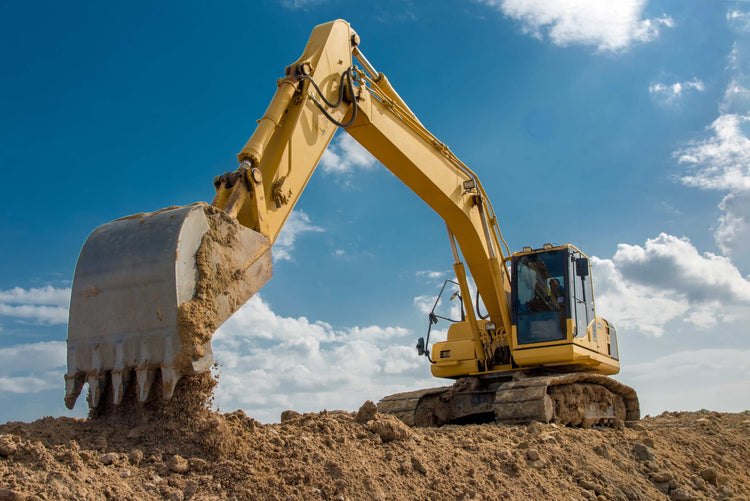Diggers, excavators and a range of other industrial machines are commonly used for construction projects or other large scale operations. Our comprehensive introduction to these industrial tools is here to give you all the information you need. From applications to attachments, we’ve got you covered! To find out more about diggers and excavators, keep on reading!
Diggers & Excavators: What’s The Difference?
The first question you may be wondering is ‘What’s the difference between diggers and excavators?’ and we’re here to give you the answers.
First things first, excavators are a type of heavy duty machinery that are used typically for digging. They can also be used for lifting and carrying materials, but on the whole, they are a piece of digging equipment. With a wide range of attachments for these machines, they are extremely versatile and can be used for a range of purposes.
So, how are they different from diggers? To put it in simple terms, the term ‘digger’ is actually a nickname for an excavator! With their strong digging capabilities, excavators have been nicknamed diggers, but these two names refer to the same machine! However, excavators have sometimes been mistaken for power shovels, another industrial digging tool, because of their similarity in appearance.
A Basic Overview Of Excavators
The basic makeup of an excavator consists of:
- A Boom
- An Arm
- A Bucket
These components all connect to a cab which sits on a rotating house. Most excavators will be able to rotate a full 360 degrees, which allows for great visibility. Excavators, or diggers, will either come with tracks or wheels, but this is dependent on the type of project being carried out.
These industrial machines can come in a range of different sizes and weights, to accommodate a range of different projects. Keep reading to find out more about the applications of diggers and excavators.
Common Applications Of Diggers & Excavators
Excavators and diggers can commonly be found on construction sites, and these are some key examples of where an excavator can be extremely advantageous.
- Road construction - Excavators are used for creating the road bed, shaping the embankments and digging out soil or land where the road is going to sit.
- Landscaping - excavators or diggers can be used on a range of landscaping projects, being used to reshape the terrain, create ponds or level the ground for a garden revamp. They can also be used to change the gradient of the land, making it steeper or flatter.
- Mining - Excavators are essential in the mining industry, being used to dig and extract minerals from the Earth. In open-pit mining activities, diggers and excavators are used to carry out large quantities of materials and minerals from the ground.
- Demolition - With the use of hydraulic breaker attachments, excavators are an excellent option when it comes to demolition projects. They are very efficient at demolishing buildings and clearing away debris.
- Sewers and waste management - excavators can be used for waste management, such as digging trenches, landfill construction and handling waste materials. They can also be used when working on sewers and other areas under the ground.
Excavator Sizes
It’s important to be aware of excavator sizes so that you can choose the most appropriate machine for your project. Listed below are some of the most common excavator sizes you would find.
Mini Excavators
Mini excavators typically weigh under 5 tons, making them easier to transport and better for projects with tight areas. They can move around more easily in tight gaps and spaces, making them a good option for landscaping projects and softer terrain.
Midi Excavators
Typically weighing between 5 and 10 tons, these excavators have more power and capacity than mini excavators, and are better for slightly larger projects that may require more lifting.
Medium / General Purpose Excavators
These are probably the most common types of excavators that you will find. Weighing between 5 and 25 tons, these machines are still relatively easy to manoeuvre, but they are heavier, which could potentially cause damage to the terrain underneath. These excavators would normally be found on construction sites.
Large Excavators
Large excavators are heavy duty machines that weigh 25 tons or more. They require a lot of power to allow their high load capacity. You would see these kinds of excavators on commercial sites, shopping centres and large scale buildings. They are good for demolition projects or other large scale operations.
Excavator Types & Attachments
Although excavators are primarily used for digging and construction, there are a wide range of models and attachments you can find to make the most of your machine’s versatility. Read below to find some examples of excavator types and attachments.
Crawler Excavators
Crawler excavators are your typical, general purpose excavators. They can be used to dig sites, for demolition or for lifting heavy items. Crawler excavators have a bucket, boom and arm towards the front of the machine, so the user has full visibility when operating.
Wheeled Excavators
Much like crawler excavators, wheeled excavators are another type of general purpose machinery, which can be used for a range of tasks on a construction site. The main difference with this type of machinery is that rather than running on tracks, they run on wheels. This is a great feature, as it allows these excavators to travel between sites and even on some roads. This makes transporting things much more efficient and cost effective.
Short Swing & Long Reach Excavators
As the names suggest, these excavators are designed with specific reach capabilities for specific projects.
Short swing excavators have a smaller reach, but are still general purpose excavators. This is beneficial in more urban settings or more awkward spaces where a smaller reach is required.
On the flip side of short swing excavators are long reach excavators. These machines do quite the opposite, with an extended arm and boom, allowing these excavators to reach much further, even carrying out underwater digging and trenching.
Backhoe Loaders
A backhoe loader is another type of machine that you would most likely see on a construction site. They are slightly different to excavators, designed to landscape and mine. These machines have a boom, arm and bucket at the back, with a large bucket or a blade attached to the front. The bucket or blade at the front of the backhoe loader is used to level or push the ground. The boom, arm and bucket at the back of this machine are good for general purpose excavating.
Excavator Attachment Tools
Moving on from the different types of excavators, we’ve outlined some of the key attachment tools that you should get to grips with!
Bucket
This is one of the most common attachments you will find for excavators. The bucket allows these machines to dig, scoop and carry materials on site.
Thumb
Thumb attachments can be extremely beneficial. They are designed to increase the load capacity of your excavator, helping to secure and strengthen grip when your excavator is carrying a heavier load.
Augers
Auger attachments are primarily used for landscaping and construction purposes. These attachments are supported by hydraulic blades, allowing your excavator to dig more efficiently and in a more timely manner.
Shears
Shears are great for demolition projects. They are the ideal tool for steel structures, cutting metal sheets and wires.
Hydraulic Breaker
Hydraulic breaker attachments, also known as ‘hammers’ are used for demolition. They can be used to demolish pavements, structures and other solid surfaces. They can be used to make the demolition process faster.
Rock Machinery: From Earth Augers To ATV Equipment
If you’re on the lookout for your next piece of industrial machinery, look no further. Here at Rock Machinery, we specialise in a range of industrial equipment for your next project. From earth augers to backhoe loaders, we have everything you need.
If you have any further enquiries about excavators, or you’re looking for something else, feel free to contact us today with any questions. Our team will be happy to help you find exactly what you’re looking for.

